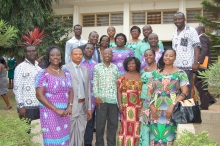Ghana: Launch of Migrant desk

The Migration desk in Accra, Ghana is part of the PSI Migration and Health and Social Care Workers Programme, and was launched in August this year.
At the opening, Richard K. Yeboah, chairman of the National Working Group (NWG) and chairman for the Health Services Workers' Union (HSWU), said that "...the day marked another milestone in the history of trade unionism in Ghana."
"The Migrant desk will serve as a focal point of the trade union outreach programme with its key element of the PSI campaign to defend quality public health services by tackling migration and human resources for health issues."
International migration is a global phenomenon which affects both the developed and underdeveloped countries, and migrant desks have so far been launced in Ghana, South Africa and Kenya.
Reynolds Ofosu Tenkorang, deputy general secretary of HSWU said that in Ghana, where unemployment and poverty are on the rise, most health professionals are enticed and compelled to seek ‘greener pastures’ in Europe and North America. He also said that without adequate information and preparation, aspiring migrants cannot make informed decisions on whether it is really in their best interest to migrate or not.
He also said that poor preparation increases the migrants’ vulnerability to illegal recruitment practices and also that there are reports of Ghanaian migrant workers, having gone through dishonest recruitment agencies or simply through irregular migration channels, ending up doing informal, low paid or unpaid work in the destination countries.
Data collected by HSWU and GRNA (Ghana Registered Nurses’ Association) show some of the reasons why health workers are migrating to developed countries.
Pull factors;
- Large health care vacancy
- Higher remuneration
- Better training and career opportunities
- Superior health infrastructure and resources
Push factors:
- Limited opportunities for professional and career development
- Poor health infrastructures
- Low salaries
- Family pressure
- Desire for better living standards
- Poor staff management
Teresa Nadia Abuga from TUC-Ghana, gave the keynote address and subsequently launched the Migrant desk in Ghana.
She said the issue of international labour migration had always been a tricky one, and acknowledged the advantages and the disadvantages to both sending and receiving countries. The advantages may be reducing unemployment, helping to earn foreign exchange through money remittances and other material transfers by migrants to countries of origin, skills creation and improvement of migrants in receiving countries. The disadvantages of brain drain in trained personnel, nurses, doctors and so on may be the other side of the issue of labour migration.
Teresa Nadia Abuga also said that in Ghana, as in other Sub-Saharan countries, the remittances of migrant workers form an essential part of the family income. She stated that the Migrant desk would help address the needs of migrant workers to and from Ghana in establishing a common strategy for comprehensive, integrated, concerted and balanced solutions to the problems of labour migrants. She said the initiative was a laudable one and hoped that other unions would emulate.

